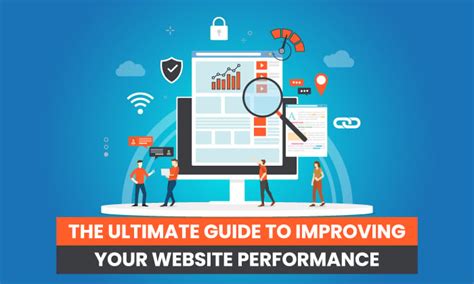Amplify your digital presence and extend your online reach by adopting proven strategies to heighten your website's visibility across leading search engines. By adopting various innovative techniques, you can boost your website's prominence and attract more organic traffic effortlessly.
Elevate your website's standing on search engines by leveraging optimization techniques that improve your website's performance in search engine rankings. Distinguish your web content by incorporating compelling keywords that resonate with your target audience's needs and interests.
In addition to keyword integration, employing well-crafted meta descriptions and title tags can influence search engine algorithms, leading to improved rankings. Maximize your website's potential by crafting unique meta descriptions and title tags that captivate users and entice them to click on your website's link.
Deliver a captivating user experience by cultivating an intuitive and visually appealing website design. Enhance your site's navigability and functionality, enabling users to effortlessly browse through your website and access relevant information. Implement intuitive menus and responsive layouts that cater to a diverse range of devices, ensuring consistent and seamless user experiences across desktops, mobile phones, and tablets.
Understanding the Fundamentals of Search Engine Optimization (SEO)

In this section, we will delve into the core principles of enhancing your website's visibility and prominence on popular search engines. By comprehending the essentials of search engine optimization, you can effectively optimize your website and achieve higher rankings in search results.
1. Establishing Keyword Relevance:
- Identify appropriate keywords and phrases relating to your website's content and target audience.
- Create high-quality and engaging content that incorporates these keywords naturally.
- Optimize your meta tags, URLs, headings, and alt tags with relevant keywords to improve search engine visibility.
2. Enhancing Website Structure:
- Improve website navigation by using clear and logical hierarchical structures.
- Create a user-friendly URL structure that reflects your website's content.
- Optimize internal linking to improve website navigation and distribute authority throughout your web pages.
3. Optimizing Page Load Speed:
- Minimize image file sizes, enable browser caching, and use content delivery networks (CDNs) for faster page loading.
- Optimize CSS and JavaScript files to reduce load times.
- Regularly monitor and optimize website performance using tools like GTmetrix or Google PageSpeed Insights.
4. Building Quality Backlinks:
- Focus on acquiring backlinks from authoritative and relevant websites.
- Create compelling and shareable content to attract natural, high-quality backlinks.
- Participate in guest blogging, social media promotion, and online forums to build strong backlink profiles.
5. Engaging in On-Page Optimization:
- Use descriptive and keyword-rich title tags, meta descriptions, and header tags.
- Optimize image alt tags and include keywords in the file names.
- Ensure content is unique, relevant, and well-structured.
6. Monitoring and Analyzing Performance:
- Regularly check your website's performance using analytics tools like Google Analytics.
- Analyze data such as organic traffic, bounce rate, and average session duration to identify areas for improvement.
- Make data-driven decisions to refine your SEO strategies and optimize your website accordingly.
By understanding and implementing these fundamental principles of search engine optimization, you can enhance your website's visibility, attract targeted organic traffic, and ultimately improve your overall online presence.
Conduct Extensive Keyword Research
In order to enhance the visibility and optimization of your website on various search engines, it is crucial to conduct thorough keyword research. This process involves analyzing and identifying the most relevant and effective keywords and phrases that internet users are likely to search for when looking for information or services related to your website.
By conducting comprehensive keyword research, you can gain valuable insights into the search habits and preferences of your target audience. This will enable you to strategically integrate these keywords throughout your website's content, metadata, and other relevant elements, allowing search engines to better understand and rank your website for the specific queries made by users.
- Start by brainstorming a list of potential keywords and phrases that are relevant to your website's content, products, or services.
- Use various keyword research tools, such as Google Keyword Planner, Ahrefs, or SEMrush, to expand your list and discover the search volume, competition, and potential ranking opportunities for each keyword.
- Consider the intent behind the keywords – whether they are informational, navigational, or transactional – to better understand the needs and expectations of your target audience.
- Utilize long-tail keywords, which are more specific and have lower competition, to capture targeted traffic and increase the chances of conversion.
- Regularly analyze and monitor the performance of your chosen keywords to identify any changes in search trends or user behavior, allowing you to adjust your keyword strategy accordingly.
Remember, effectively conducting keyword research is a continuous process that requires constant refinement and adaptation to remain competitive in the ever-evolving landscape of search engine optimization.
Enhance Your Website's On-Page Elements to Boost Performance

Reinforce the potency of your website's on-page fundamentals to heighten its effectiveness in the online domain. By optimizing various aspects of your web pages, you can elevate your website's visibility, credibility, and overall ranking.
1. Content Optimization: Sharpen the quality and relevance of your content by utilizing targeted keywords, engaging headings, and informative meta descriptions. Enable your content to captivate and retain your audience's attention and satisfy their search intent.
2. Title Tag Enhancement: Craft compelling and concise titles for your web pages, facilitating easy identification and promoting intriguing click-through rates on search engine result pages. Incorporate relevant keywords to optimize your title tags and entice potential visitors.
3. URL Structure: Construct search engine-friendly URLs that accurately depict the content of your web pages. Utilize descriptive keywords and eliminate unnecessary parameters for improved readability and indexing.
4. Image Optimization: Optimize images by utilizing descriptive alt text, reducing file sizes, and ensuring fast loading times. Enhance user experience and increase the visibility of your website by making images accessible and search engine-friendly.
5. Internal Linking: Create a well-structured internal linking system to establish connections between your web pages. This facilitates easy navigation for both users and search engine crawlers, enhancing the discoverability and indexability of your website.
6. Heading Tags: Implement appropriate heading tags (H1, H2, H3, etc.) to organize and structure your content. Utilize relevant keywords in headings to aid search engines in understanding the context and hierarchy of your information.
7. Mobile-Friendly Design: Ensure that your website is fully optimized for mobile devices, as an increasing number of users access the web through smartphones and tablets. Responsive design and fast loading times on mobile contribute to a positive user experience and improved search engine ranking.
8. Page Speed Optimization: Boost your website's performance by optimizing its loading speed. Minimize unnecessary code, compress images, and leverage browser caching to ensure swift loading times, ultimately enhancing user satisfaction and search engine ranking.
By implementing these on-page optimization tactics, you can fortify your website's visibility, credibility, and ranking on search engines, amplifying its impact in the digital realm.
Create Compelling and Captivating Content
When it comes to enhancing your online visibility and attracting a larger audience, creating high-quality and engaging content is crucial. By crafting compelling and captivating content, you can significantly improve your website's visibility and attract more visitors, ultimately boosting your online presence.
Deliver Valuable Information: One of the keys to creating high-quality content is to provide valuable information to your audience. This can be achieved by conducting thorough research and delivering accurate, up-to-date, and relevant information that your target audience will find useful and informative. By offering valuable insights and expertise, you will establish yourself as an authoritative source in your industry.
Engage Your Readers: Engaging your readers is essential to ensure they stay on your website longer and keep coming back for more. Incorporate storytelling techniques, use a conversational tone, and employ emotional appeals to create a personal connection with your audience. By establishing a genuine connection, you can capture their attention and encourage them to explore more of your content.
Optimize for Readability: Ensure that your content is easy to read and understand. Break up your text into shorter paragraphs, use headings, subheadings, and bullet points to provide a clear structure. Highlight important information using bold or italic formatting. Additionally, use relevant images, videos, or infographics to enhance visual appeal and break up the text.
Implement SEO Strategies: To improve your website's search engine ranking, it is essential to optimize your content for search engines. Conduct keyword research and strategically incorporate relevant keywords throughout your content. However, avoid keyword stuffing and focus on maintaining a natural flow of your writing. Incorporate internal and external links to authoritative sources to boost your content's credibility and improve its search engine visibility.
Promote Social Sharing: Encourage your audience to share your content on social media platforms. Integrate social sharing buttons on your website, making it easy for visitors to share your articles, blog posts, or other content with their networks. By leveraging the power of social media, you can increase your content's reach and attract a broader audience.
In conclusion, creating high-quality and engaging content is a pivotal factor in improving your website's visibility and attracting more traffic. By delivering valuable information, engaging your readers, optimizing for readability, implementing SEO strategies, and promoting social sharing, you can ensure that your content stands out amidst the online competition and drives potential customers to your website.
Creating a Strong Backlink Profile: Boosting Website Visibility and Authority

When it comes to enhancing the visibility and authority of your website on search engines, establishing a robust backlink profile is paramount. The quality and quantity of backlinks leading to your site greatly influence its ranking and credibility among search engine algorithms. In this section, we will explore the importance of building a strong backlink profile and provide effective strategies to improve your website's online presence.
To begin, let's define backlinks as external links that direct users from other websites to yours. These backlinks act as votes of confidence for your website, signaling to search engines that your content is valuable and trustworthy. By earning a diverse range of backlinks from authoritative and relevant sources, you can enhance your website's credibility and improve its organic search rankings.
Building a strong backlink profile requires a strategic approach. Firstly, focus on acquiring backlinks from reputable websites within your niche or industry. Seek out collaborations, partnerships, or guest blogging opportunities to generate high-quality backlinks. Secondly, strive for a varied anchor text profile, using relevant keywords naturally to optimize the impact of your backlinks. This helps search engines understand the context and relevance of your website content.
Another effective strategy for building a strong backlink profile is to create high-quality content that naturally attracts inbound links. By crafting informative and engaging articles, infographics, or videos, you increase the likelihood of other websites wanting to link to your valuable content. Additionally, promoting your content through social media channels and online communities can help to expand its reach and attract even more backlinks.
Periodically assessing your backlink profile is essential to ensure its strength and effectiveness. Regularly monitor the quality and relevance of the websites linking to yours, and disavow any suspicious or low-quality backlinks that may potentially harm your SEO efforts. By consistently maintaining a strong backlink profile, your website will not only improve its visibility on search engines but also establish itself as a reliable and authoritative source within your industry.
| Key Takeaways for Building a Strong Backlink Profile: |
|---|
| 1. Obtain backlinks from reputable websites in your industry. |
| 2. Diversify your anchor text and use relevant keywords. |
| 3. Create high-quality content to attract natural inbound links. |
| 4. Promote your content through social media and online communities. |
| 5. Regularly monitor and manage your backlink profile. |
Enhance User Experience on Your Site
Creating a pleasant and satisfying user experience on your website is crucial for attracting and retaining visitors. By focusing on elements that engage and delight users, you can encourage them to stay longer, explore more, and ultimately increase the success of your website.
One effective way to improve user experience is by optimizing your site's navigation. Ensure that your menu is intuitive and easy to navigate, providing clear and concise labels for each page. Implementing a search function can also help users quickly find the information they are looking for.
In addition, optimizing the loading speed of your website is essential. Users value fast-loading sites, as they positively contribute to a smooth and efficient browsing experience. Minimize the use of large images or videos that may slow down your site and use compressed files whenever possible.
Another aspect to consider is the responsiveness of your website. With the increasing use of mobile devices, it is crucial that your site is mobile-friendly and adjusts seamlessly to different screen sizes. This ensures that users can access and navigate your site comfortably, regardless of the device they are using.
Providing high-quality, relevant, and engaging content is also key to enhancing user experience. Tailor your content to meet the needs and interests of your target audience, ensuring it is well-structured and easy to read. Incorporate visually appealing elements such as images, infographics, or videos to make your content more engaging.
| Enhance User Experience on Your Website: |
|---|
| - Optimize site navigation |
| - Improve loading speed |
| - Ensure mobile responsiveness |
| - Provide high-quality, engaging content |
Remember, by prioritizing user experience, you can attract more visitors to your website, encourage return visits, and ultimately improve its overall performance and success.
Maximizing Online Visibility with Social Media

In today's digital landscape, establishing a strong online presence is crucial for any business or organization. One highly effective strategy to increase visibility and attract more visitors to your website is by utilizing the power of social media platforms.
Enhance Engagement through Social Channels
By leveraging social media, companies can engage with their target audience and foster meaningful connections. Social channels provide opportunities to showcase your brand, products, and services, and enable users to interact with your content. This engagement can lead to increased visibility as users share, comment, and recommend your website to their network.
Utilize the Strength of Different Social Platforms
Each social media platform offers unique features and benefits. It is important to identify which platforms resonate the most with your target audience and focus your efforts on those. For example, visual-based platforms like Instagram and Pinterest can be valuable for showcasing visually appealing products, while LinkedIn might be more suitable for establishing professional connections and B2B networking.
Create Shareable and Engaging Content
To maximize your visibility on social media, it is essential to consistently produce high-quality and shareable content. This can include informative blog posts, captivating visuals, and engaging videos. By providing valuable content that resonates with your target audience, you increase the likelihood of it being shared and gaining exposure to a wider audience.
Interact and Respond to User Feedback
Social media is not just a one-way communication channel. It offers an opportunity to listen to your audience and respond to their feedback, comments, and inquiries. By actively engaging with your followers, you show that you value their input and are dedicated to providing exceptional customer service. This can generate positive word-of-mouth and strengthen your online reputation.
Leverage Influencer Marketing
Partnering with influencers in your industry can greatly amplify your reach and visibility on social media. Influencers have established credibility and a large following, making their recommendations highly influential. By collaborating with them, you can tap into their audience and gain exposure to potential customers who may not have discovered your website otherwise.
In conclusion, harnessing the power of social media is an effective way to boost your website's visibility and attract more visitors. By engaging with your target audience, sharing valuable content, and leveraging the strengths of different social platforms, you can significantly improve your online presence and ultimately drive more traffic to your website.
Implement Local SEO Strategies
Enhance your online presence and boost your visibility in specific geographic areas with the implementation of local SEO strategies. By focusing on optimizing your website for local search results, you can effectively target and attract potential customers within your target market.
Here are some effective strategies to consider:
- 1. Optimize your website's content by using location-specific keywords and phrases that accurately represent your business and its offerings.
- 2. Create and optimize your Google My Business profile, ensuring that all relevant information about your business is complete, accurate, and up-to-date.
- 3. Build high-quality local citations by listing your business on reputable online directories and platforms.
- 4. Encourage your satisfied customers to leave positive reviews on popular review websites, which can significantly impact your local search rankings.
- 5. Utilize schema markup to provide search engines with structured data about your business, such as your address, phone number, and operating hours.
- 6. Develop a strong presence on local social media platforms to engage with your local audience and increase brand awareness.
- 7. Ensure that your website is mobile-friendly, as a majority of local searches are conducted on mobile devices.
- 8. Target local keywords in your website's meta tags, headings, and URL structure to align with the specific regions you serve.
- 9. Collaborate with other local businesses or organizations in your community through partnerships and sponsorships to gain exposure and drive traffic to your website.
- 10. Monitor your local SEO performance regularly using analytics tools, and make necessary adjustments to continually optimize your strategy.
By implementing these local SEO strategies, you can improve your website's visibility among local audiences and increase the likelihood of attracting targeted local traffic. Remember, optimizing for local search is crucial for businesses looking to thrive in specific geographic areas.
Regularly Monitor and Analyze Your Website's Performance

In order to ensure the ongoing success of your website, it is crucial to regularly monitor and analyze its performance. By keeping a close eye on the various metrics and indicators, you can identify areas that require improvement and make informed decisions to enhance the overall performance of your website.
Monitoring your website's performance entails tracking a range of factors, such as website traffic, user engagement, conversion rates, loading speed, and search engine rankings. By using various analytical tools and platforms, you can gain valuable insights into how well your website is performing and identify any issues or bottlenecks that may be hindering its success.
By regularly analyzing this data, you can identify patterns, trends, and opportunities for improvement. For example, if you notice a decline in website traffic, you can investigate the possible causes and take appropriate measures to rectify the situation. Similarly, if you find that certain pages have a high bounce rate, you can examine the content and layout to improve their engagement and encourage visitors to stay longer.
Monitoring and analyzing your website's performance also enables you to evaluate the effectiveness of your SEO strategies. By tracking your search engine rankings and organic traffic, you can determine whether your current optimization efforts are yielding desired results or if adjustments need to be made.
Overall, regularly monitoring and analyzing your website's performance allows you to stay proactive in addressing any issues or shortcomings and optimize your website for better visibility, user experience, and ultimately, improved rankings on search engines.
Stay Informed About Algorithm Updates and Evolving SEO Trends
In the ever-changing landscape of SEO, staying updated with algorithm changes and SEO trends is crucial for maintaining a competitive edge in search engine rankings. Keeping up with the latest updates and trends can help you adapt your website's optimization strategies to align with the evolving search engine algorithms and user expectations.
1. Monitor Search Engine Algorithm Updates Search engines like Google regularly update their algorithms to enhance the quality and relevance of search results. By keeping an eye on these updates, you can gain valuable insights into the factors that influence search rankings and adjust your SEO strategies accordingly. |
2. Follow Industry-leading SEO Blogs and Websites Stay connected with the SEO community by following authoritative blogs and websites that regularly publish updates and analysis on algorithm changes and SEO trends. These sources provide expert insights, case studies, and practical tips to help you optimize your website effectively. |
3. Engage in Online SEO Communities Joining online forums, discussion groups, and social media communities focused on SEO can help you interact with experts and peers in the field. By actively participating in these communities, you can stay informed about the latest algorithm changes, share experiences, and learn from the successes and challenges of others. |
4. Attend SEO Conferences and Webinars SEO conferences and webinars provide excellent opportunities to learn from industry leaders, network with like-minded professionals, and gain valuable insights into upcoming algorithm updates and evolving SEO trends. By attending these events, you can stay ahead of the curve and make informed decisions for your website's optimization. |
5. Continuously Analyze and Improve Your SEO Strategy Regularly analyze the performance of your website, track keyword rankings, monitor traffic patterns, and assess user behavior. These ongoing analyses will help you identify any discrepancies, adapt to changing trends, and refine your SEO strategy to ensure continued improvement in your website's ranking on search engines. |
Remaining up to date with algorithm changes and SEO trends is essential for businesses and website owners striving to maximize their visibility and attract organic traffic. By staying informed and adjusting your strategies accordingly, you can ensure that your website remains competitive in search engine rankings, driving relevant traffic and achieving your online goals.
FAQ
What are some tips for improving my website ranking on search engines?
There are several strategies you can implement to improve your website ranking on search engines. Firstly, make sure your website is mobile-friendly and has fast loading speed. Additionally, optimize your website's content with relevant keywords and meta tags. Building high-quality backlinks from reputable websites and regularly updating your content can also positively impact your ranking. Finally, ensure that your website has a user-friendly design and provides a great user experience.
How can I make my website more mobile-friendly?
To make your website more mobile-friendly, you should use a responsive design that automatically adapts to different screen sizes. Optimize your images and other media for mobile devices, and ensure that your text and buttons are easily readable and clickable on mobile screens. It's also important to test your website on various mobile devices and use mobile-friendly plugins or themes if you're using a content management system like WordPress.
What is the role of keywords in improving website ranking?
Keywords play a crucial role in improving website ranking on search engines. By conducting keyword research, you can identify the popular search terms related to your website's content. Incorporating these keywords naturally into your website's content, meta tags, headings, and URLs can make it easier for search engines to understand the relevance of your site. However, it's important to avoid keyword stuffing, as search engines consider this a spammy practice that can harm your website's ranking.
Why is it important to regularly update my website's content?
Regularly updating your website's content is important for several reasons. Firstly, it shows search engines that your website is active and relevant, which can positively impact your ranking. Fresh content also provides value to your visitors, encouraging them to spend more time on your site and return in the future. Additionally, updating your content gives you the opportunity to incorporate new keywords and optimize your pages for better visibility on search engines.



